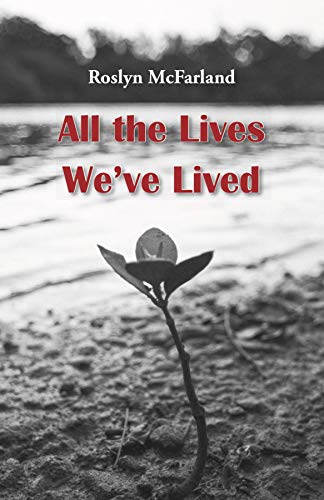 Reviewed by Magdalena Ball
Reviewed by Magdalena Ball
All the Lives We’ve Lived
by Roslyn McFarland
Ginninderra Press
Paperback, ISBN: 9781760417857, $35, Sept 2019
In Greek Mythology, Alethia is the personified spirit of truth, truthfulness, and sincerity. In Roslyn McFarland’s debut novel, All the Lives We’ve Lived, Alethia opens and closes the book. Although she doesn’t quite become a character, this disembodied female voice is ever present, weaving through the narrative like a thread that is poetic and thematic. The book is structured into a series of mostly self-contained stories. The characters are all connected in some way to Salt Pan Creek, a real place near the Canterbury-Bankstown region of Sydney. Salt Pan Creek is also the site of the famous uprising led by Pemulwuy against colonial explorer oppressors in 1809. It also becomes a makeshift camp for those left homeless by government policy in the 1920s and 30s. Though McFarland uses a light hand to describe some of these pivotal events, they form a continuum that provides the backdrop to the pieces in this collection, and have a profound impact on the stories that unfold.
The pieces vary quite a lot in length, some as short as a paragraph. The different narratives parallel one another, moving between past and present, each in its own timeline. One of the narratives is the arrival of the First Fleet at Botany Bay in 1788, and the ensuing misunderstandings, brutalities and mercenary behaviour that destroys the lives of the people very successfully inhabiting the land when they arrive. Another is the story of Kate Ward, a woman in her fifties who returns to Salt Pan Creek to examine her own past. These include Kate’s relationship with her community, her estranged son Adam and his American wife, her best friend Denise, her romances, especially with Gary, an Aboriginal boy that she broke up with after falling pregnant with his child, her parents, and her brother Mark. Throughout the book each of these characters have their own stories that intersect with and inform Kate’s narrative. There are also other stories, often historical or philosophical fragments, like Bertrand Russell’s writings on the nature of death, a local shopkeeper’s gruesome murder, Bob Hope’s visit to Laureton, or Joe Anderson/King Burraga’s 1933 film calling for parliamentary representation for Aboriginal people. These pieces stand alone as mini tales, but because they pivot around the overall theme, and also are often set in the same locale, they connect to Kate’s story. Some of the stories vary in structure, including several love poems written by one of the characters, a recording made by Gary’s parents providing him with his own history, and a piece written solely as a series of character studies:
Silas was a loner an rarely spoke to anyone. His only form of greeting was a high-pitched giggle that made people wary of him. He lived on the western side of Salt Pan Road in a in-roofed, unpainted fibre cottage that had a simple wooden veranda looking out onto a narrow front yard which was filled with an assortment of rusted metal machinery. (“Fish out of water”, 142)
Throughout the book, the writing is careful, observant, and often poetic, particularly in the Alethea passages. These passages have a sense of timelessness, and they form a connective tissue for the other stories in the collection, functioning outside of time, though rooted in place, a constant for these pieces:
I speak truth for truth’s sake. It is preordained within the name you know me by – Alethea. Google me, if you must From there, you’ll glean all that I represent – everything that Lethe, that timeworn river of amnesia, is not. Its waters murmer irresistible invitations to sleep, while its banks deliver drowsy dreams of poppy magic.
Dismiss the past, Lethe whispers. Forget, forget. But I cannot. (211)
Kate’s return to Salt Pan Creek and her examination is about the nature of the lives we live and about truth. So much is buried and hidden particularly in terms of the Aboriginal occupants and the way in which their stories have been destroyed, rewritten, and suppressed. Kate’s trajectory is one of discomfort and discovery as she unearths, and then rewrites her history and the history of Salt Pan Creek, facing the wrongs she and her people, including her own parents, have done, and attempting to right them. McFarland does a beautiful job of pulling history, fiction, multiple love stories and trauma together into a coherent narrative that is powerful. All the Lives We’ve Lived is a sensitive and beautifully written story with deep resonance.